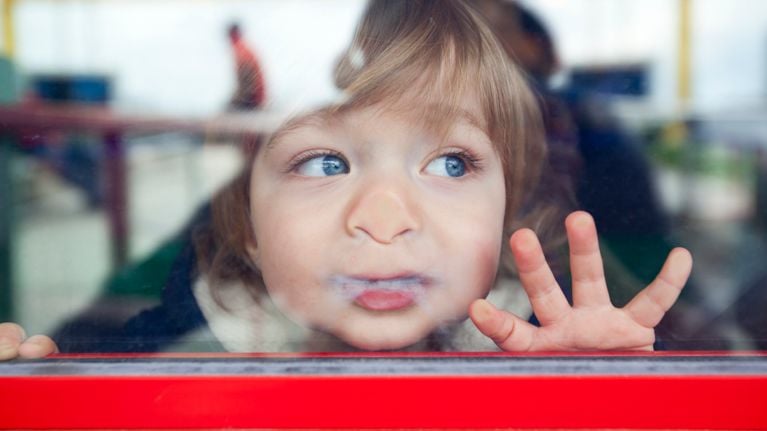Help Kids Transition to Daycare: A Guide for Parents
While transitioning to daycare can be scary for both you and your little one, believe us, it's worthwhile.

Getty / Jake Warga
Starting childcare can be a difficult time for children and caregivers alike. It takes a lot of trust to let someone educate and care for your children, no matter the school’s prestige. That's why we've put together our top tips to help kids transition to daycare.
During this transition, your child may be uncomfortable or scared of spending the day away from you in a new environment. You may also have all the feels about sending them out into the world without you. These feelings are completely normal for both you and your child.
The benefits of childcare for both parent and child
While transitioning to daycare can be scary for both you and your little one, believe us, it's worthwhile. There are lots of benefits to this new learning environment. In daycare, children build and practice cognitive, physical, social, and emotional skills under the guidance of highly skilled early childhood educators.
Daycare teaches kids how to socialize with other children and adults, which can build self-confidence and life-long friendships. On the flip side, childcare allows parents more freedom to go back to work after parental leave, run errands and generally have a bit of time to themselves. Parents may also find daycare introduces them to a whole new support network of educators and potential new parent friends.
New friends and opportunities aside, adjusting to daycare life will take time for everyone involved. Luckily, with the right support system and a little preparation, you can ease any anxieties and ensure your child's transition into childcare is a great success.

Tips to help kids and parents transition to daycare
Visit the new center or school
Visit the new school and learn how the center runs and about its educational philosophy before daycare starts. Ask lots of questions so that you feel confident your child will be in good hands.
Bring your child along, maybe even more than once, before full-time child care begins. Seeing the school, meeting the teachers, and getting a feel for the environment will help your child feel more comfortable and excited about starting daycare.
Teach them about daycare and discuss their concerns
Before enrolling your child into daycare, talk to them about it, including what their day will look like, how it will be different from home, where you will go, and when you will come back.
Read books or watch tv episodes together about starting a new school to help your child understand what their new routine will be like—and so they can see that they're not alone in their anxieties. Many books and shows include narratives about first-day jitters.
Emphasize that school is a fun place for learning, and practice playing school together at home to familiarize them with the concept. At the same time, acknowledge and discuss their concerns and let them know that being nervous is normal and that you are there for them whenever they want to talk.
Your child will need some time to adjust to their new daycare, so give them time and space to express their feelings along the way.

Practice their new routine
Practice any changes to their nighttime schedules as well. It’s especially pivotal to help your child acclimate to the daycare’s nap schedule and encourage them to stay in their nap space until the designated wake-up time.
Establishing these routines before your kiddo starts daycare can give them a leg up and help them feel more at ease during their first few days and weeks.
Prepare and organize before drop-off
Set yourself and your child up for success. Most centers will provide a packing list so the child is well-prepared with the proper supplies (extra clothes, shoes, outdoor gear, etc.). Check with the center for food restrictions when packing snacks and lunches.
Label EVERYTHING with your child’s name! If allowed at your daycare center, your child might want to pack a favourite toy, blanket or even snack to remind them of home.
Arrive extra early the first week
It is entirely normal to have separation anxiety, so ease into things. Give yourself plenty of time during drop off, an extra 20 to 30 minutes more than you think necessary, to help your child get comfortable in a new place.
It could be difficult for you and your child to separate in the transition process until you get used to your new routine.
Celebrate your time together outside of childcare
Create memories and spend quality time with your child outside of childcare. These memories will give your child something to celebrate when they return to class and something to look forward to if the daycare transition is more difficult in the first few weeks.
Also, as this will be difficult for you both, and with childcare being stimulating, make sure to create downtime and stick to self-care as you both ease into your new schedule.
Author
Kristen Miller, Director of Education for Celebree School, a leader in early childhood education that provides infant and toddler care, preschool, before and aftercare, and summer camp programs.
Weekly Newsletter
Keep up with your baby's development, get the latest parenting content and receive special offers from our partners